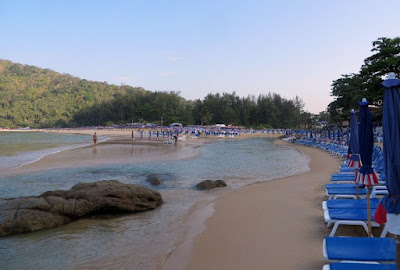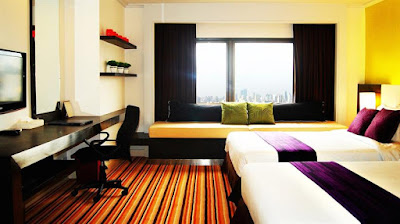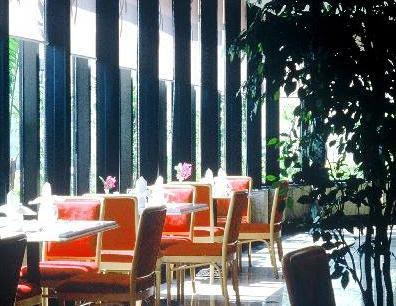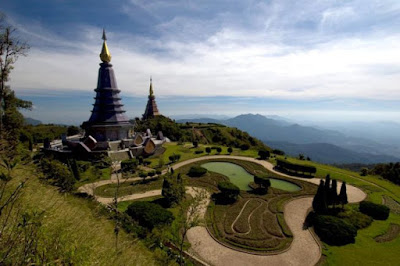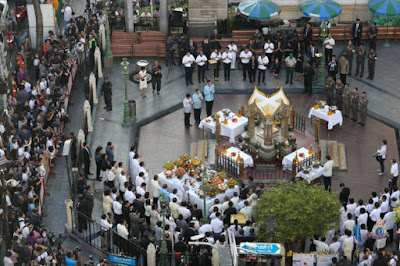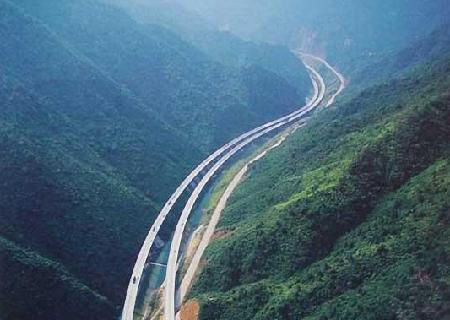PHUKET:
After months of indecision and false-steps in the creation of new beach
rules for Phuket, the governor yesterday announced a final solution to
the island’s beach chair drama.
“There will be slight modifications to the 10 per cent zone system that has been in place up to this point,” explained Governor Nisit Jansomwong. “Beachgoers will be allowed to bring their own chairs, umbrellas and mats, while rental operators will only be allowed to provide mats and umbrellas. However, everyone must keep their beach furniture within the marked 10 per cent zones.”
Rental operators cannot stake claims to any part of the beach with unoccupied mats and will not be allowed to rent out chairs to most visitors. Nonetheless, exceptions will be made, such as for the elderly and disabled, confirmed Governor Nisit.
However, such a loophole in the system is open for abuse, as the governor did not address in the meeting who would be available to rent out chairs to the disabled and elderly or who would be in charge of making the judgment call of who is qualified.
Policies for other beach vendors were also laid out during the meeting.
“There will be no food or cigarettes sold on the beach, while non-alcoholic drinks will be allowed,” said Gov Nisit. “Vendors supplying other goods, such as souvenirs, fireworks or Chinese lanterns will not be allowed.”
Masseuses will be allowed to work within a designated area and there will be no change in policy for operators running marine activities, such as jet-skiing and parasailing, confirmed Gov Nisit.
The announced plan was backed by months of research conducted by the Prince of Songkhla University’s Phuket Beach Management Research team.
“Our team, comprising professional, non-biased researchers, spoke with all stakeholders before putting forth our suggestion,” said Pun Thongchumnum, head of the research team.
The research identified six major stakeholders: tourists, 75 per cent of those spoken to were westerners; beach vendors of all types, as well as local tourism authorities; locals, both those inland and in beach communities; high-ranking members of the local governments; honorary consuls; and the online community.
“Based on the interviews we conducted with tourists arriving and departing Phuket, the number one priority was clean beaches. This was followed by ‘pure nature’ and facilities, with beach activities being the lowest priority,” said Dr Pun.
After speaking with interested parties, the research group was able to divide the facilities category into two groups: paid and unpaid.
“Most wanted to be able to use umbrellas and sunbeds, while having access to beverages – all as paid services. The most important unpaid service was security,”
It has yet to be seen if the recently launched Phuket Beach Police units will fulfill this need (story here).
The study also found that many local people and vendors still disagreed with the 10 per cent zoning system. However, researches suggested that they coordinate their efforts to work together under the provincial beach management committee. - See more at: http://www.phuketgazette.net/phuket-news/Beach-chairs-back-Phuket-sands/61832#ad-image-0
#PHUKET: After months of indecision and false-steps in the creation of new beach rules for Phuket, the governor yesterday announced a final solution to the island’s beach chair drama.“There will be slight modifications to the 10 per cent zone system that has been in place up to this point,” explained Governor Nisit Jansomwong. “Beachgoers will be allowed to bring their own chairs, umbrellas and mats, while rental operators will only be allowed to provide mats and umbrellas. However, everyone must keep their beach furniture within the marked 10 per cent zones.”
Rental operators cannot stake claims to any part of the beach with unoccupied mats and will not be allowed to rent out chairs to most visitors. Nonetheless, exceptions will be made, such as for the elderly and disabled, confirmed Governor Nisit.
However, such a loophole in the system is open for abuse, as the governor did not address in the meeting who would be available to rent out chairs to the disabled and elderly or who would be in charge of making the judgment call of who is qualified.
Policies for other beach vendors were also laid out during the meeting.
“There will be no food or cigarettes sold on the beach, while non-alcoholic drinks will be allowed,” said Gov Nisit. “Vendors supplying other goods, such as souvenirs, fireworks or Chinese lanterns will not be allowed.”
Masseuses will be allowed to work within a designated area and there will be no change in policy for operators running marine activities, such as jet-skiing and parasailing, confirmed Gov Nisit.
The announced plan was backed by months of research conducted by the Prince of Songkhla University’s Phuket Beach Management Research team.
“Our team, comprising professional, non-biased researchers, spoke with all stakeholders before putting forth our suggestion,” said Pun Thongchumnum, head of the research team.
The research identified six major stakeholders: tourists, 75 per cent of those spoken to were westerners; beach vendors of all types, as well as local tourism authorities; locals, both those inland and in beach communities; high-ranking members of the local governments; honorary consuls; and the online community.
“Based on the interviews we conducted with tourists arriving and departing Phuket, the number one priority was clean beaches. This was followed by ‘pure nature’ and facilities, with beach activities being the lowest priority,” said Dr Pun.
After speaking with interested parties, the research group was able to divide the facilities category into two groups: paid and unpaid.
“Most wanted to be able to use umbrellas and sunbeds, while having access to beverages – all as paid services. The most important unpaid service was security,”
It has yet to be seen if the recently launched Phuket Beach Police units will fulfill this need (story here).
The study also found that many local people and vendors still disagreed with the 10 per cent zoning system. However, researches suggested that they coordinate their efforts to work together under the provincial beach management committee. - See more at: http://www.phuketgazette.net/phuket-news/Beach-chairs-back-Phuket-sands/61832#ad-image-0
“There will be slight modifications to the 10 per cent zone system that has been in place up to this point,” explained Governor Nisit Jansomwong. “Beachgoers will be allowed to bring their own chairs, umbrellas and mats, while rental operators will only be allowed to provide mats and umbrellas. However, everyone must keep their beach furniture within the marked 10 per cent zones.”
Rental operators cannot stake claims to any part of the beach with unoccupied mats and will not be allowed to rent out chairs to most visitors. Nonetheless, exceptions will be made, such as for the elderly and disabled, confirmed Governor Nisit.
However, such a loophole in the system is open for abuse, as the governor did not address in the meeting who would be available to rent out chairs to the disabled and elderly or who would be in charge of making the judgment call of who is qualified.
Policies for other beach vendors were also laid out during the meeting.
“There will be no food or cigarettes sold on the beach, while non-alcoholic drinks will be allowed,” said Gov Nisit. “Vendors supplying other goods, such as souvenirs, fireworks or Chinese lanterns will not be allowed.”
Masseuses will be allowed to work within a designated area and there will be no change in policy for operators running marine activities, such as jet-skiing and parasailing, confirmed Gov Nisit.
The announced plan was backed by months of research conducted by the Prince of Songkhla University’s Phuket Beach Management Research team.
“Our team, comprising professional, non-biased researchers, spoke with all stakeholders before putting forth our suggestion,” said Pun Thongchumnum, head of the research team.
The research identified six major stakeholders: tourists, 75 per cent of those spoken to were westerners; beach vendors of all types, as well as local tourism authorities; locals, both those inland and in beach communities; high-ranking members of the local governments; honorary consuls; and the online community.
“Based on the interviews we conducted with tourists arriving and departing Phuket, the number one priority was clean beaches. This was followed by ‘pure nature’ and facilities, with beach activities being the lowest priority,” said Dr Pun.
After speaking with interested parties, the research group was able to divide the facilities category into two groups: paid and unpaid.
“Most wanted to be able to use umbrellas and sunbeds, while having access to beverages – all as paid services. The most important unpaid service was security,”
It has yet to be seen if the recently launched Phuket Beach Police units will fulfill this need (story here).
The study also found that many local people and vendors still disagreed with the 10 per cent zoning system. However, researches suggested that they coordinate their efforts to work together under the provincial beach management committee.
Source: PhuketGazette
For the Best #Hotels and #Resorts
We help you with your #Bookings >
BOOK NOW SIMPLE CLICK ON THIS LINK ON OR THE BANNER
http://planet-asian.blogspot.com/
https://asiabesthotels.wordpress.com/
https://europeanbesthotels.wordpress.com/
http://www.tripadvisor.com/members/Gerrit_Tienkamp
We help you with your #Bookings >
BOOK NOW SIMPLE CLICK ON THIS LINK ON OR THE BANNER
http://planet-asian.blogspot.com/
https://asiabesthotels.wordpress.com/
https://europeanbesthotels.wordpress.com/
http://www.tripadvisor.com/members/Gerrit_Tienkamp
PHUKET:
After months of indecision and false-steps in the creation of new beach
rules for Phuket, the governor yesterday announced a final solution to
the island’s beach chair drama.
“There will be slight modifications to the 10 per cent zone system that has been in place up to this point,” explained Governor Nisit Jansomwong. “Beachgoers will be allowed to bring their own chairs, umbrellas and mats, while rental operators will only be allowed to provide mats and umbrellas. However, everyone must keep their beach furniture within the marked 10 per cent zones.”
Rental operators cannot stake claims to any part of the beach with unoccupied mats and will not be allowed to rent out chairs to most visitors. Nonetheless, exceptions will be made, such as for the elderly and disabled, confirmed Governor Nisit.
However, such a loophole in the system is open for abuse, as the governor did not address in the meeting who would be available to rent out chairs to the disabled and elderly or who would be in charge of making the judgment call of who is qualified.
Policies for other beach vendors were also laid out during the meeting.
“There will be no food or cigarettes sold on the beach, while non-alcoholic drinks will be allowed,” said Gov Nisit. “Vendors supplying other goods, such as souvenirs, fireworks or Chinese lanterns will not be allowed.”
Masseuses will be allowed to work within a designated area and there will be no change in policy for operators running marine activities, such as jet-skiing and parasailing, confirmed Gov Nisit.
The announced plan was backed by months of research conducted by the Prince of Songkhla University’s Phuket Beach Management Research team.
“Our team, comprising professional, non-biased researchers, spoke with all stakeholders before putting forth our suggestion,” said Pun Thongchumnum, head of the research team.
The research identified six major stakeholders: tourists, 75 per cent of those spoken to were westerners; beach vendors of all types, as well as local tourism authorities; locals, both those inland and in beach communities; high-ranking members of the local governments; honorary consuls; and the online community.
“Based on the interviews we conducted with tourists arriving and departing Phuket, the number one priority was clean beaches. This was followed by ‘pure nature’ and facilities, with beach activities being the lowest priority,” said Dr Pun.
After speaking with interested parties, the research group was able to divide the facilities category into two groups: paid and unpaid.
“Most wanted to be able to use umbrellas and sunbeds, while having access to beverages – all as paid services. The most important unpaid service was security,”
It has yet to be seen if the recently launched Phuket Beach Police units will fulfill this need (story here).
The study also found that many local people and vendors still disagreed with the 10 per cent zoning system. However, researches suggested that they coordinate their efforts to work together under the provincial beach management committee. - See more at: http://www.phuketgazette.net/phuket-news/Beach-chairs-back-Phuket-sands/61832#ad-image-0
“There will be slight modifications to the 10 per cent zone system that has been in place up to this point,” explained Governor Nisit Jansomwong. “Beachgoers will be allowed to bring their own chairs, umbrellas and mats, while rental operators will only be allowed to provide mats and umbrellas. However, everyone must keep their beach furniture within the marked 10 per cent zones.”
Rental operators cannot stake claims to any part of the beach with unoccupied mats and will not be allowed to rent out chairs to most visitors. Nonetheless, exceptions will be made, such as for the elderly and disabled, confirmed Governor Nisit.
However, such a loophole in the system is open for abuse, as the governor did not address in the meeting who would be available to rent out chairs to the disabled and elderly or who would be in charge of making the judgment call of who is qualified.
Policies for other beach vendors were also laid out during the meeting.
“There will be no food or cigarettes sold on the beach, while non-alcoholic drinks will be allowed,” said Gov Nisit. “Vendors supplying other goods, such as souvenirs, fireworks or Chinese lanterns will not be allowed.”
Masseuses will be allowed to work within a designated area and there will be no change in policy for operators running marine activities, such as jet-skiing and parasailing, confirmed Gov Nisit.
The announced plan was backed by months of research conducted by the Prince of Songkhla University’s Phuket Beach Management Research team.
“Our team, comprising professional, non-biased researchers, spoke with all stakeholders before putting forth our suggestion,” said Pun Thongchumnum, head of the research team.
The research identified six major stakeholders: tourists, 75 per cent of those spoken to were westerners; beach vendors of all types, as well as local tourism authorities; locals, both those inland and in beach communities; high-ranking members of the local governments; honorary consuls; and the online community.
“Based on the interviews we conducted with tourists arriving and departing Phuket, the number one priority was clean beaches. This was followed by ‘pure nature’ and facilities, with beach activities being the lowest priority,” said Dr Pun.
After speaking with interested parties, the research group was able to divide the facilities category into two groups: paid and unpaid.
“Most wanted to be able to use umbrellas and sunbeds, while having access to beverages – all as paid services. The most important unpaid service was security,”
It has yet to be seen if the recently launched Phuket Beach Police units will fulfill this need (story here).
The study also found that many local people and vendors still disagreed with the 10 per cent zoning system. However, researches suggested that they coordinate their efforts to work together under the provincial beach management committee. - See more at: http://www.phuketgazette.net/phuket-news/Beach-chairs-back-Phuket-sands/61832#ad-image-0

